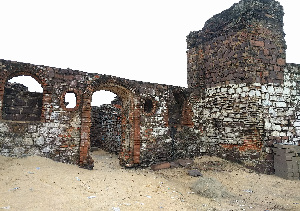A great African merchant, businessman, and state-builder, John Kabes (also spelled John Cabess or John Cabes) established the paramount stool of the prosperous port city of Komenda in the Eguafo Kingdom of the Gold Coast (Ghana).
Despite his tight links to the British and his role as a supplier to the Royal African Company, he utilized them as players in his game with other European countries. Cabess was known as one of the “merchant princes” of the Gold Coast in the 1700s by historian Kwame Daaku because of his combined economic and political dominance.
He may have been the first native African trader to be a millionaire and do business with Europeans.
He opened the way for other well-known and wealthy Caboceers from the Gold Coast, like Cudjoe of Cape Coast and Eno Baissie Kurantsi of Anomabo.
Sources say that Cabess rose to prominence as a political and economic powerhouse along the coast in the early 1700s thanks to his success as a merchant, and his influence can be seen throughout history, from the Komenda Wars to the rise of the Ashanti Empire and the expansion of British power in West Africa.
It was during his nearly forty-year career as a trader and political leader that he founded the paramount stool of Komenda, which had previously been a part of the inland state of Eguafo.
Cabess started as a dealer for the English—and occasionally the Dutch—and worked his way up to a position of political power, which, however, he may have attained it, proved to be permanent because it was following pre-existing political norms.
In the 1670s, Cabess moved to the port of Komenda to help the British establish business relationships there.
Captain Bracon, an African trader, was the port’s most influential British contact in the 1670s, but by 1686, Cabess had superseded him, researcher and historian Kweku Darko Ankrah wrote.
Cabess was a famous businessman in Komenda by the 1680s. Cabess may have visited Komenda sometime between 1683 and 1685, as suggested by Henige. A British merchant boasted that without Cabess in Komenda, “nothing will be done” in terms of trade and contacts at the port. He supplied the Royal African Company in Komenda and everywhere else along the coast with shells, food, and personnel to build forts and factories.
The Komenda wars
According to the African American Registry, the Komenda Wars broke out around 1694. Until 1700, the Eguafo Kingdom in modern-day Ghana was wracked by battles over trade rights, primarily between the Dutch West India Company and the British Royal African Company.
Cabess was a very important part of the British cause, and he worked to get them back to Komenda. In 1694 and 1695, Cabess attacked the Dutch fort more than once. This led to talks with the Dutch commander, Willem Bosman, who tried to shoot Cabess but missed. Since the battles ended after 1700 and the Ashanti Empire expanded its trade along the coast, Cabess played an important role as an intermediary in the city’s economy.
Darko Ankrah says that Cabess died in 1722 but his successors ran the port’s economy for the rest of the 18th century.
Source: face2faceafrica.com
 Home Of Ghana News Ghana News, Entertainment And More
Home Of Ghana News Ghana News, Entertainment And More





